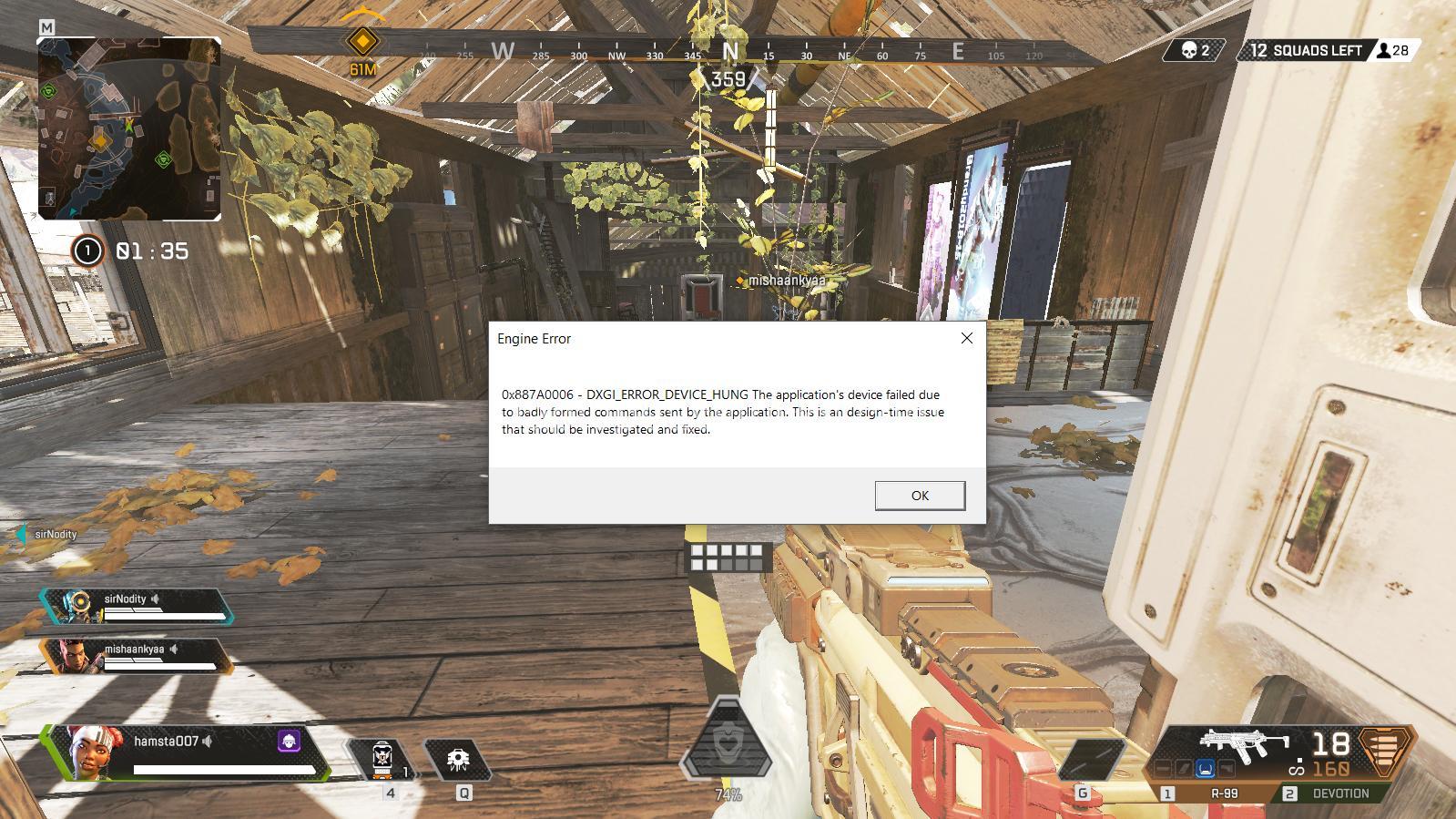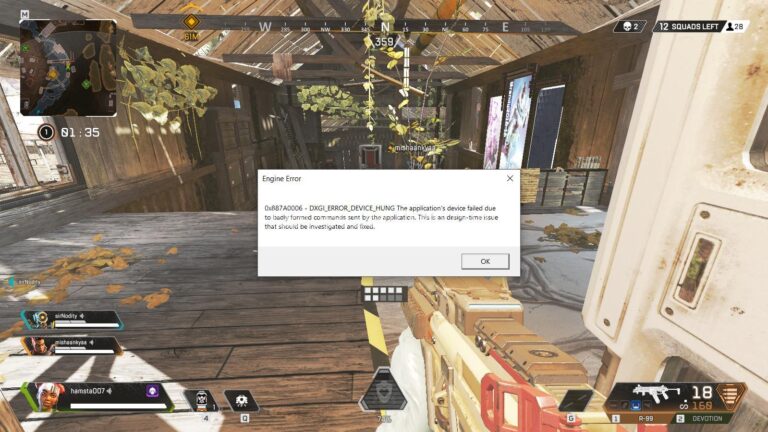Fix Apex Legends Crashes: Laptop Solutions. In today’s article, laptopeasytricks.com will explore with you in the most detailed and complete way. See now!
mmediately Fix Apex Legends Crashes on Your Laptop: Quick Troubleshooting Steps
Okay, let’s be real. Nobody wants to spend half their gaming session troubleshooting. So, before we dive into the deeper stuff, let’s try these quick fixes. Think of them as the first-aid kit for your Apex Legends experience. Often, a simple restart is all it takes.
First things first, restart your laptop. It sounds cliché, but a surprising number of problems disappear with a simple reboot. While you’re at it, restart Apex Legends itself. Sometimes, the game gets into a funky state, and a fresh start is just what the doctor ordered.
Next, let’s tackle those pesky background applications. Having a bunch of programs running in the background can really hog your system’s resources, leading to those dreaded crashes. So, close any unnecessary programs. Think of it as decluttering your digital desktop. Browsers, streaming apps, and other resource-intensive apps should be your first targets.
Now, it’s time to check for updates. Seriously, this is crucial. Outdated drivers (especially your graphics driver!) can lead to all sorts of issues, including crashes. So head to your system settings and check for pending Windows updates. Then, open your game launcher (Origin or Steam) and ensure that Apex Legends is fully updated to the latest version. These updates frequently include patches aimed at fixing bugs and improving stability – exactly what we need.
And finally, a quick graphics adjustment can sometimes work wonders. If you’re running your game on max settings, try dialing them down temporarily. Lowering the resolution, shadows, or texture quality might be enough to stabilize the game without dramatically affecting the visual experience. It’s like turning down the bass—it doesn’t mean you’re listening to a worse song, just a more manageable one for your system. Think of it as a temporary solution while you troubleshoot further. Once you’re back in the game, you can gradually raise settings one at a time to see how high you can go without any issues.
Identifying the Root Cause of Apex Legends Crashes on Your Laptop
Okay, the quick fixes didn’t work? Time to get a little more technical. Think of this as detective work – we’re going to systematically investigate potential culprits.
First, let’s check if your laptop meets Apex Legends’ system requirements. Head to the official Apex Legends website. You’ll find the minimum and recommended specifications. Compare those to your laptop’s specs (CPU, GPU, RAM, storage). If you’re significantly below the minimum, well, you might have found your problem. Upgrading your hardware might be the best course of action.
Next, consider overheating. Laptops get hot, and that heat can be extremely detrimental to performance. Does your laptop feel like a furnace when you play Apex Legends? If so, that’s a major red flag. Consider using a laptop cooling pad – a simple investment that can prevent overheating and enhance longevity of your laptop’s components. You can also try cleaning the vents to ensure good airflow. Using temperature monitoring software can help identify if your CPU or GPU are getting excessively hot.
Next, check your hard drive space. Games need space to breathe, both for installation and for saving game files. If your hard drive is nearing capacity, Apex Legends (and your entire system!) might struggle to run smoothly, leading to crashes. Free up some space by deleting unnecessary files or transferring files to an external drive. If you’re running low on storage space, this might be the underlying reason for your performance issues.
Finally, let’s delve into drivers. Outdated or corrupted graphics drivers are notorious for causing game crashes. Head to the website of your graphics card manufacturer (Nvidia, AMD, or Intel) and download the latest drivers. Make sure you’re downloading the driver specifically for your model of graphics card. Remember, incorrect drivers can create even more issues than outdated ones.

Optimizing Your Laptop for Smooth Apex Legends Gameplay
Alright, we’ve identified potential problems, now let’s work on making your laptop Apex Legends-ready. This isn’t just about fixing crashes; it’s about getting the most out of your gaming experience. Think of this phase as preventative maintenance – keeping your system in tip-top shape to avoid future issues.
Start with keeping your drivers updated. This isn’t a one-time thing; it’s an ongoing process. Check for driver updates regularly, ideally using the manufacturer’s software (Nvidia GeForce Experience, AMD Adrenalin, or Intel Driver & Support Assistant). These tools often automatically notify you of available updates. Staying on top of these updates improves your game’s performance and system stability, making it less prone to crashes.
Next, let’s talk about in-game settings. While those ultra-high settings look amazing, they come at a cost. Lowering certain settings—like resolution, shadow quality, anti-aliasing, and texture quality—can dramatically improve performance. Experiment to find the best balance between visuals and performance. The difference between “high” and “medium” might not be noticeable in terms of visuals, but it will make a huge difference in your frame rates and stability.
Keeping your background processes under control is crucial. Before launching Apex Legends, close unnecessary applications. This frees up system resources, allowing your game to run more smoothly. You’ll be surprised how much of an impact this small step can have.
And, let’s not forget about those pesky background processes consuming your RAM. Keeping a check on what’s running in the background can greatly improve your gaming experience. Using Task Manager on Windows or Activity Monitor on macOS gives you insight into your system’s usage. Close those processes and watch your game performance increase.
Now, let’s talk cooling. Overheating is a common cause of game crashes. If your laptop consistently overheats, invest in a laptop cooling pad. This will keep your system cool under pressure and prevent performance throttling or crashes. If you suspect overheating might be contributing to your issue, take steps to remedy it.
Advanced Troubleshooting for Persistent Apex Legends Crashes
We’ve covered the basics; now, let’s tackle some more advanced troubleshooting techniques. These steps are generally more involved and should be tried if the previous suggestions didn’t resolve your issue.
If you’ve tried everything else, verifying the game files integrity might help. This scans your game files and replaces any corrupted or missing files. Instructions for this process can be found within your game launcher (Origin or Steam). Think of this as a digital check-up for your game files.
If file verification doesn’t work, a clean reinstall might be necessary. This is more time-consuming, but often highly effective for resolving persistent crashes. Uninstalling the game and reinstalling it from scratch can resolve underlying issues. Remember to back up any saved game data before doing this, just in case.
Running Apex Legends as administrator can provide the game with the necessary permissions to run without interference. This method may resolve permission issues preventing the game from running optimally.
Sometimes, the issue isn’t Apex Legends itself, but rather conflicting software or hardware. Try temporarily disabling any recently installed software, drivers, or peripherals, and then relaunch Apex Legends. If the crash stops, you’ve found your culprit!
If you’re still plagued by crashes, it might be time to consider a hardware upgrade. If your components are underpowered, upgrading your RAM, storage, or even your GPU could significantly improve performance.
When to Seek Professional Help for Apex Legends Crashes
Despite the best efforts, some problems require a professional eye. Don’t hesitate to reach out for help if you’ve exhausted all troubleshooting options, and the crashes persist. This might indicate a more complex issue that requires a specialist.
If you’ve tried all the previous steps and still have unresolved game crashes, then contacting the game’s support or seeking professional help might be necessary. Remember, troubleshooting isn’t always an easy process, so don’t hesitate to seek external assistance.
FAQs about How to Fix Crashes in Apex Legends on Laptops?
What are the most common causes of Apex Legends crashes on laptops?
The most common causes include outdated drivers, overheating, insufficient RAM, low storage space, and conflicting software. Addressing these issues often resolves the problem.
My laptop meets the minimum requirements, but Apex Legends still crashes. What should I do?
Even if your system meets minimum requirements, it may still struggle to run Apex Legends smoothly. Try lowering your in-game settings, updating drivers, and checking for overheating. If the issue persists, consider upgrading your RAM.
I’ve tried everything, and Apex Legends still crashes. What’s next?
If you’ve exhausted all troubleshooting steps, consider reinstalling the game, running the game as administrator, or contacting EA Support for assistance.
How do I prevent future crashes in Apex Legends?
Regularly updating your drivers, managing background applications, monitoring your system’s temperature, and keeping sufficient storage space are key to preventing future crashes.
Can upgrading my hardware fix Apex Legends crashes?
Upgrading your hardware, particularly RAM and your GPU, can significantly improve performance and stability, and consequently reduce crashes.
Conclusion
So there you have it! Hopefully, you’ve found the solution to your Apex Legends crashing woes. If you have any questions or success stories, feel free to leave a comment below. Share this article with your fellow gamers! For more laptop tips and tricks, head over to laptopeasytricks.com – Jame Macvey signing off!

